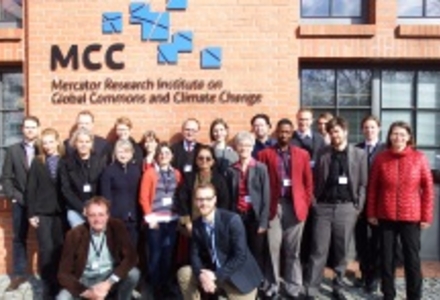G20 think tanks: How to link climate policy and financial stability
G20 Think Tanks met to discuss how to link climate policy and finance stability and to conclude on the group’s policy briefs.

[Translate to EN:] Foto: MCC
The Mercator Research Institute on Global Commons and Climate Change (MCC), together with the Centre for International Governance Innovation (CIGI) from Canada and other scientific think tanks, have developed sound climate policy recommendation for Germany’s G20 presidency. The group known as the “T20 Task Force Climate Policy and Finance”, including roughly 100 members covering nearly all G20 countries, proposes a comprehensive approach that links growth, development and climate goals built on sustainable infrastructure with three key pillars: strengthening growth strategies to exploit the significant opportunities of low-carbon investments; transforming finance to be a driver of change; and phasing out fossil fuel subsidies as well as putting a price on carbon. The latter would also harness the transformative power of the market and stimulate low carbon investment.
The three key pillars are included in the group’s policy brief as discussed during their second official meeting on Tuesday at the MCC in Berlin. The policy brief – together with policy briefs on Green Finance, Innovation, Improving quality of live in Africa, Resource Trade, and Energy Transition Monitoring – will be presented and officially handed over to the G20 policy makers at the T20 summit in May. The T20 process comprises a total of nine task forces each of which will be engaging directly and personally with policy-makers. The heads of state and government of the G20 will be meeting at the G20 Hamburg summit in early July 2017.
The MCC will furthermore present the key pillars during the “Berlin Energy Transition Dialogue” (BETD) on March 20/21. There the institute is going to specifically focus on carbon pricing in a coalition with the Federation of German Industries (BDI) and the environment organization Germanwatch. This unusual alliance urge the G20 countries to drive ambitious climate protection, create more predictability for planning, promote fair competition and secure the necessary investments. These aims – as well as reaching the targets set forth in the Paris Agreement – could be reached simultaneously by introducing carbon pricing.
More information:





